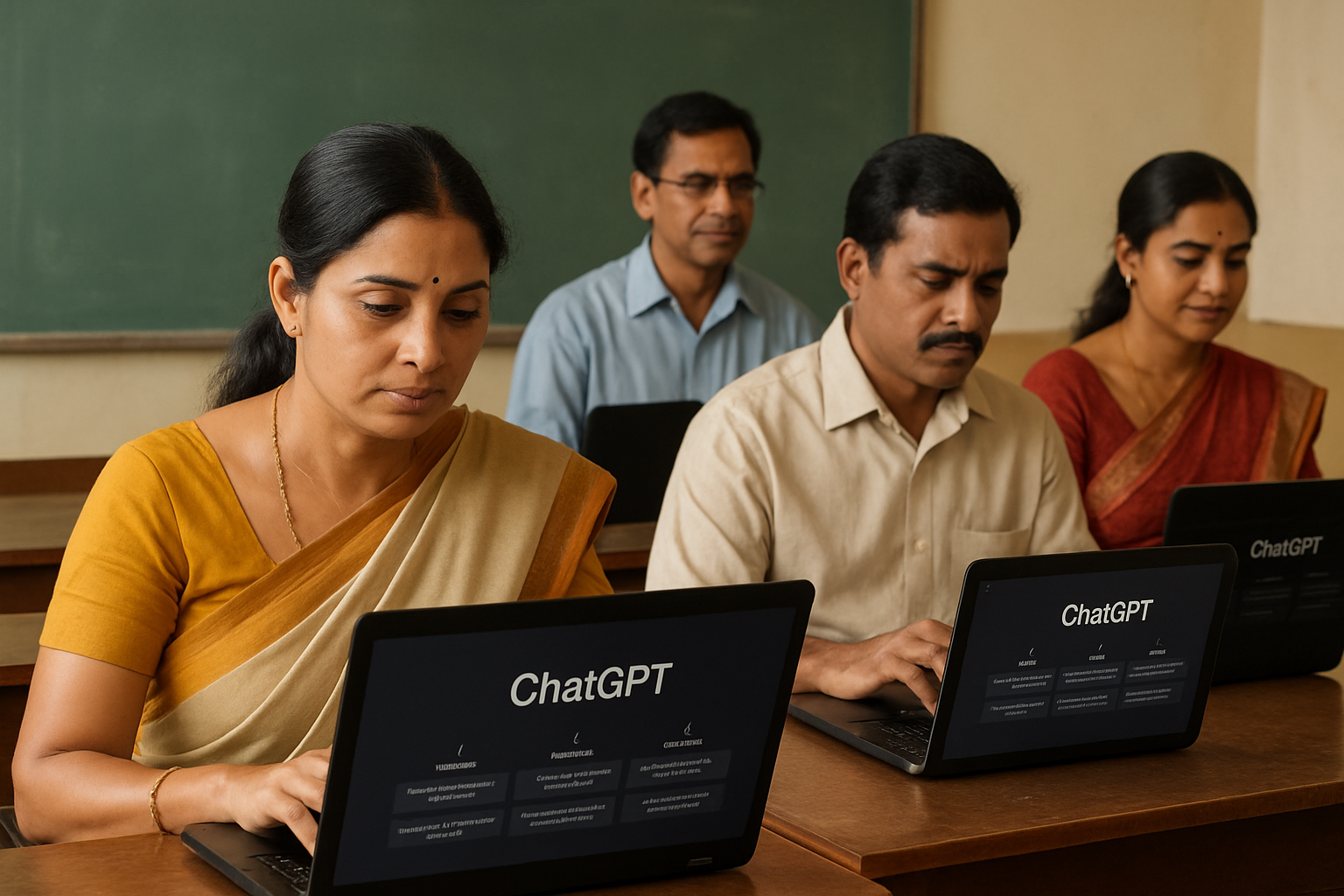Quick Take
- OpenAI distributed 500,000 free ChatGPT Plus licenses to Indian government schools and technical institutes
- New Study Mode supports CBSE curricula and IIT-JEE competitive exams with step-by-step tutoring
- ₹500,000 research partnership with IIT Madras to study AI impact on learning outcomes
- ChatGPT usage tripled in India over past year, positioning country as primary AI education testing ground
- OpenAI plans New Delhi office launch in 2025 with dedicated India education head
OpenAI launches India’s largest AI education initiative, distributing free licenses while establishing ₹500,000 research partnership with IIT Madras to transform classroom learning.
OpenAI has rolled out a sweeping education initiative across India, handing out 500,000 free ChatGPT Plus licenses to government schools, technical institutes, and ARISE member schools. The move establishes India as OpenAI’s main testing ground for AI-powered classroom integration across different types of educational institutions.
The company is targeting three main distribution channels: the Ministry of Education for government schools, AICTE for technical institutes, and ARISE member schools for K-12 educators. This approach ensures wide coverage across India’s educational system.
Strategic AI Deployment Changes How Students Learn
ChatGPT’s new Study Mode directly supports Indian curricula including CBSE boards and competitive exams like IIT-JEE. Rather than simply generating answers, Study Mode works as a personal tutor, offering step-by-step guidance through interactive questions and structured teaching.
“This targeted approach addresses a critical challenge: ensuring AI deepens learning rather than shortcuts vital thinking,” according to Pragya Misra, head of policy India at OpenAI. The feature has already caught on with Indian students, showing early market success.
Research Partnership Creates Innovation Framework
The initiative includes a ₹500,000 research collaboration between OpenAI and IIT Madras. This partnership will run long-term studies on how AI affects learning outcomes, exploring new teaching methods informed by cognitive neuroscience. Research findings will be shared openly and guide future OpenAI product development.
“Dr. Kamakoti Veezhinathan, Director of IIT Madras, highlighted the collaboration’s goal to ‘reshape pedagogy and expand education research,'” positioning the institute as a global center for AI-education research. This academic partnership provides solid validation for the initiative’s educational impact.
Leadership Structure Speeds Up Market Growth
OpenAI appointed Raghav Gupta, former Managing Director of Coursera India, as Head of Education for India and the Asia Pacific. Gupta brings deep experience in education and consumer technology to scale AI access for students, teachers, and researchers.
“By working closely with universities, schools, government bodies, and educators, we have an opportunity to transform education through AI,” Gupta stated. His job includes strengthening government and institutional partnerships while ensuring responsible AI use.
OpenAI plans to open its first India office in New Delhi in 2025, with CEO Sam Altman expected to visit soon. This physical presence shows long-term market commitment and expanded partnership potential.
Government Support Provides Strong Implementation Push
Government backing gives crucial momentum for widespread adoption. Prof. T.G. Sitharam, Chairman of AICTE, emphasized AI’s role in “redefining how we shape the future of our technical workforce.” The partnership lets AICTE integrate AI across disciplines while focusing on hands-on, industry-relevant training.
“Harikumar Janakiraman, Director of Digital Education at the Ministry of Education, confirmed the partnership will extend AI access to government school teachers nationwide.”
This government support reduces regulatory risks and speeds up market penetration across India’s educational infrastructure.
Market Positioning Creates Strong Competitive Edge
The program builds on recent India-focused initiatives, including ChatGPT Go, an India-specific subscription tier priced at ₹399 per month with UPI payment integration, and enhanced Indic language support in the latest GPT model. Student ChatGPT usage tripled in India over the past year, showing existing momentum.
This initiative puts OpenAI ahead of competitors in the education technology space by building institutional relationships that create lasting competitive advantages. The timing aligns with India’s upcoming AI Action Summit in February 2026, strengthening OpenAI’s position as a preferred AI partner for educational transformation.
Business Impact Reaches Beyond Education Sector
The initiative creates multiple business opportunities for companies investing in educational technologies aligned with OpenAI’s framework. Organizations can develop complementary tools for the Indian market or partner with institutions adopting AI-powered learning systems.
The program empowers educators to focus on creativity and mentorship by automating routine tasks. OpenAI’s comprehensive training programs foster AI literacy and confidence among educators, ensuring responsible technology implementation across diverse educational settings.
Global Impact Sets Industry Standards
OpenAI’s India-first approach provides a blueprint for AI integration in education systems worldwide. Success in India’s diverse educational landscape—from elite universities to rural schools—demonstrates scalability for other emerging markets.
The program’s emphasis on responsible AI use, teacher training, and outcome measurement sets industry standards for educational AI deployment. These practices will likely influence global education technology policies and partnerships, establishing frameworks for ethical AI integration in learning environments.
This transformative initiative represents strategic investment in India’s future workforce development and establishes a testing ground for AI-powered education on unprecedented scale.




